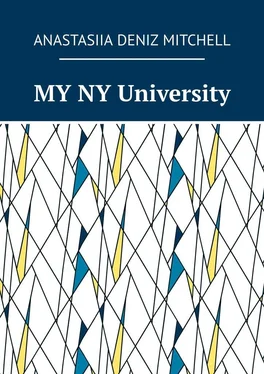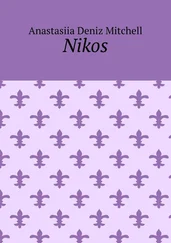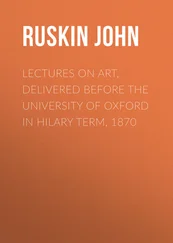«Stop it! Stop it! Stop-p-p it-t-t!» he interrupted me.
«What’s wrong with that?»
«Nothing. But: you mustn’t read it. Tell us all about the play WITHOUT reading and even looking at your notes.»
I was struck. How come I couldn’t read anything at all?
«Well, and how am I going to do it?»
«I don’t know. Some-how, I’d say.»
I was struggling to remember at least a bit of what I wrote last night. But in vain.
«Hmmm… And what shall I do with you? Give you a „D“?»
«N-n-no. Why should you?»
«Because you’ve come to the class unprepared.»
«I am!»
«I don’t see it, judging by your eyes trying to find something in the notebook. How many pages have you written?»
«Ten.»
«And how many have you learnt?»
I fell silent.
«I’ll answer the question for you: you’ve learnt none. None! Can you imagine that?»
He was loose in the beans. High time to go to the asylum.
«So, for this class, Ella will get a „D“.» He said this in a sarcastic manner and then looked at me.
«Okay, if you aren’t ready, continue reading.» He put the stress on the word «reading’.
«Sure!» I said calmly.
I went on READING, as he told me to.
To be honest, I didn’t remember where I stopped, so I started with what my eyes fell on:
The main source of the play is Thomas North’s translation of Plutarch’s «Lives’. Shakespeare makes Caesar’s triumph take place on the day of Lupercalia instead of six months earlier. For dramatic effect, he makes the Capitol the venue of Caesar’s death rather than the Curia Pompeia. Caesar’s murder, the funeral, Antony’s oration, the reading of the will and the arrival of Octavius all take place on the same day in the play. However, historically, the assassination took place on 15 March, the will was published on 18 March, the funeral was on 20 March, and Octavius arrived only in May. Shakespeare has Caesar say «Et tu, Brute?» («And you, Brutus?») before he dies. Shakespeare deviated from these historical facts to curtail time and compress the facts so that the play could be staged more easily. The tragic force is condensed into a few scenes for heightened effect. The play contains many anachronistic elements from the Elizabethan era. The characters mention objects such as doublets (large, heavy jackets), which did not exist in ancient Rome.
«Okay. Enough,» he said, smiling and showing his white teeth.
At that moment, I saw how handsome he was. His smile was magnificent. He’d got dark hair. And he wore quite a decent (!) suit. Of course, all our university teachers had to wear decent suits, not to get fired.
And, well, he had an aquiline nose. A Roman one. It meant he entered my life as a conqueror of my heart!
He did.
I don’t know what happened. I started to like him. No, I even began to adore him. How strange of me! To like the crazy man who laughed at every single mistake of yours.
We listened to the other students. Then, Andrew said:
«Okay. The facts about William Shakespeare were a warm-up. What you’ll have to do for the next time is to find information about the English literature before the Norman conquest. So, the Anglo-Saxon and the Anglo-Norman literature. Is the task clear?»
Frankly speaking, I didn’t understand a word. What should we find? Which period was given..?
I had to do something about that.
«The Anglo-Saxons, whoever they were…»
«The Anglo-Saxons, whoever they were, did many things for us. Not for us as Americans, but for us as a whole population. That is, the humans. And what they did you’ll find at home. Or at the library, as you like.»
Smart words.
So, I went to the library again. This time, I needed to find something about Old English. And, seemingly, English during and after the Norman conquest. Hmm…
What I found evaded any explanation. I understood practically nothing.
Well, at least, I had to write it all down:
Old English, or Anglo-Saxon, is the earliest recorded form of the English language, spoken in England and southern and eastern Scotland in the early Middle Ages. It was brought to Great Britain by Anglo-Saxon settlers in the mid-5th century, and the first Old English literary works date from the mid-7th century. After the Norman conquest of 1066, English was replaced, for a time, as the language of the upper classes by Anglo-Norman, a relative of French. This is regarded as marking the end of the Old English era, as during this period the English language was heavily influenced by Anglo-Norman, developing into a phase known now as Middle English…
Quite a long writing. It took good ten pages.
Wait, I’d found even more! (I had to make a brilliant display in front of our professor):
Englisc, from which the word English is derived, means ’pertaining to the Angles’. In Old English, this word was derived from Angles (one of the Germanic tribes who conquered parts of Great Britain in the 5th century). During the 9th century, all invading Germanic tribes were referred to as Englisc. It has been hypothesised that the Angles acquired their name because their land on the coast of Jutland (now mainland Denmark) resembled a fishhook <���…>
The Old English period is followed by Middle English (12th to 15th century), Early Modern English and finally Modern English.
This took another twenty notebook pages.
Now, it was time to find something about Anglo-Norman. It was twice as hard.
After filling thirty-five pages in total with writing, I decided that I was ready for the class.
Frankly speaking, I had some strange feeling. As if I was NERVOUS before my speech. But why? Why had I got this feeling? I don’t know. But I didn’t want to make a blooper in front of Andrew anyway.
So, I needed to prepare my speech in advance. Was it possible to learn it all by heart..? I didn’t think so. There must’ve been another way to impress the teacher.
I started rehearsing my speech. It turned out long enough. I hoped he’d like it. The first thing I had to bear in mind is the keep-smiling art. The second thing was to keep my head while speaking.
I hope there’s a piece of advice on how to pull oneself together at night. Wait, I also had to look well. Otherwise, he wouldn’t look at me.
So, I’d been rehearsing until it was time to go to bed. To be honest, I’d done only Andrew’s subject today. So what? I had some time to get ready for the other ones as well.
«So, who’s going to speak first?» he asked.
«Me!» I shouted out.
«Hmm… Why so impatiently, Ella?»
«I’ve just been preparing for your subject…»
«What, for the whole night?» he interrupted me.
«Absolutely not!»
«Then, why’re you so confident? Did you know that people behave like this only if they’ve been studying all night?»
«I didn’t.»
I didn’t want bad blood to appear between us. And I hoped it wouldn’t.
«Ella, you’re quite quick on the uptake!»
«Thank you!»
«It’s not a compliment, you know!» he laughed.
«What’s it, then?» I asked.
«It’s nothing! Just nothing! By the way, do you know any synonyms for the word «nothing’?»
We all were taken aback. What synonyms? For what word..?
«No one knows a single synonym,» I said.
«Oh, and why? Aren’t you the students of New York University?» he asked, pretending to be bewildered and raising his eyebrows.
«There’s an expression. I hope you know at least that,» he turned to the blackboard and wrote the following:
«So, what’s this and who said this?» he asked.
Читать дальше












